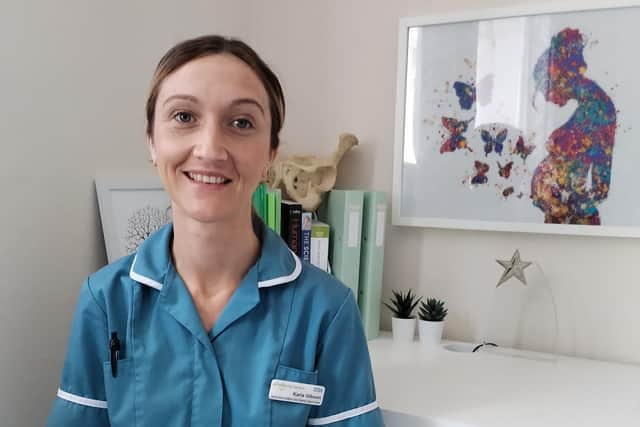Vital Signs: Podcast by Leeds Teaching Hospitals NHS Trust shines light on health workers' lives
“People always think that being a midwife is all about delivering their babies, lovely outcomes, but actually, sadly, we know that some families don't always have positive outcomes,” says Karla. “So some days can be quite tough in clinic or in the delivery suite, so it's really good to have that solid network behind you to be able to give you that emotional support as well.
“We hold it together quite a lot for our patients, because we need to empathise and support them - but sometimes we need that support as well, as staff.”
Advertisement
Hide AdAdvertisement
Hide AdKarla has opened up about her work in Vital Signs, a four-part podcast which is capturing the daily lives of the people and services at Leeds Teaching Hospitals NHS Trust.


It comes after the BBC television series Saving Lives in Leeds, the eight-part access all areas documentary that aired earlier in the year, with the Trust now inviting listeners to take a “deeper dive” into some of the key areas of its work.
Each 30-minute episode brings several voices together to explore their specialities.
One episode unveils the power of play at Leeds Children’s Hospital, where a specialist playworker uses distraction and preparation techniques, tailored for each young person to help them process and manage their appointments.
Advertisement
Hide AdAdvertisement
Hide AdElsewhere, in the 10th anniversary year of the Major Trauma Centre at Leeds, different people bring their working day to life and they talk about the importance and challenges of getting along with each other, and why Leeds is leading in the field of trauma care.
Another episode follows the story of the liver transplant team and the journey that takes place to deliver a new organ to a patient – Leeds is a national centre for liver transplant, just one of the specialties that sets the Trust apart.
In the episode on future talent, a pioneering gynaecology surgeon give two very different accounts of their working lives and how their learning brings about better patient care.
It also features mother-of-three Karla, 35, of Cookridge, who says it is “such a privilege” to do her job.
Advertisement
Hide AdAdvertisement
Hide Ad“I think, for most families, it's one of the happiest, but one of the most vulnerable times of their life and I think if we can make it a little bit better, or ensure they've got the best support, then we've already kind of done our job there.”
Karla has worked in health since leaving school but is about to become one of three midwifery degree apprentices, a new role in the Trust which allows staff to work towards becoming a midwife while earning a salary.
She was often around doctors and nurses as an adolescent in the asthma clinic but her aunt, Lynda Bailey, who is a specialist nurse, was a big factor in Karla’s decision to pursue a career in the NHS.
“I saw her from being a healthcare assistant on a ward and she has worked her way up, alongside having children. I think she was my real inspiration.”
Advertisement
Hide AdAdvertisement
Hide AdWhen Karla set out on her nurse cadet apprenticeship at 16, her aunt was there to give her advice.
As a cadet she worked on various wards and gained experience, but once she went to university to start nurse training, she decided that wasn’t for her, and got a job with Leeds Teaching Hospitals as a healthcare assistant. For the last 11 years she has worked as a maternity support worker, recently specialising in areas such as mental health.
In her efforts to become a midwife, Karla had to resit her maths GCSE aged 32, then self-fund an access course.
As part of her degree, she will do classroom work at the University of Huddersfield as well as working on the wards, and is due to graduate in 2027, the same year as her 17-year-old daughter Kaitlyn, who wants to become a teacher.
Advertisement
Hide AdAdvertisement
Hide AdIn another family connection, Karla’s mother, Angela Burrow, is also a healthcare assistant on a children's paediatric ward at Leeds General Infirmary.
Karla’s episode, about the next generation of talent, shows how Leeds is “ever-evolving,” she says.
It’s also a way of getting young people interested in the world of health care.
Karla, also mother to Laila, 13, and Elliott, 11, says: “We always think of the NHS as just being doctors and nurses, and looking after poorly people and all that kind of thing, but actually there’s so much more to it. There’s so many different roles, and all these different roles build it together as a team. So it's really nice to know what is going on, what's new.
Advertisement
Hide AdAdvertisement
Hide Ad"Especially for people at school and teenagers not knowing which way they want to go with their career, it's quite good to listen to (people in) other roles within the hospital and opportunities to give them a little bit of an idea of a journey that they could take on a route towards their career goals.”
Shahid Farid, Consultant Transplant Surgeon, is another Trust worker who is involved in the podcast.
He says: “We undertake some exceptional work here in Leeds, not just for patients in the city, but as a specialist centre for patients travelling from further afield. To be able to spotlight some of those services and the complex number of people involved, is a really great opportunity.”
The third episode of Vital Signs is out today on main podcast platforms, with the final episode relased next Monday.